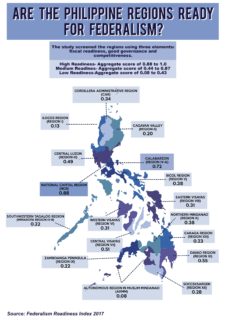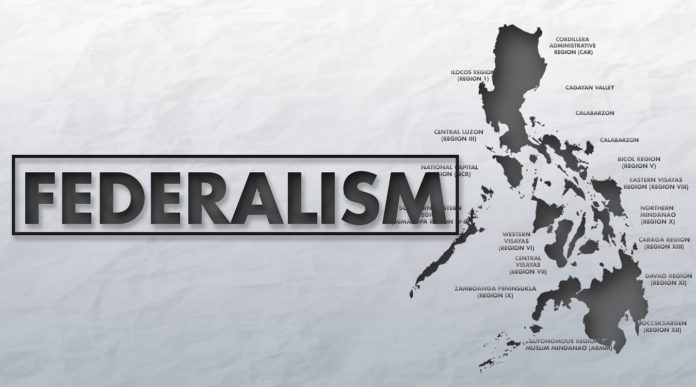AN UNPUBLISHED research funded by the government found that the Philippines is not ready to transition to a federal form of government as only a minority of the proposed federal regions are prepared both economically and socio-politically.
Dennis Coronacion, chairman of UST’s Department of Political Science, together with Froilan Calilung, were among those tapped by the government to conduct research on the readiness of the country for a federal system.
Calilung said only five out of the proposed 18 regions were ready for the shift to a federal system of government, including Metro Manila and Calabarzon.
“Only five regions are ready based on the parameters we have tested on… kasi ang readiness index mayroon siyang inclusive parameter para masabi na ready… ang lumalabas, lima lang ‘yong ready,” he said in an interview with the Varsitarian.

The study screened the regions using three qualifiers: fiscal readiness, which measured the resources earned and fiscal transfers in a region; good governance, which assessed the local government’s performance as well as the people’s participation and transparency compliance with government procedures; and competitive index, which measured the level of competitiveness of local government units.
The study, however, was not published by Malacañang. Calilung and Coronacion said they plan to publish it separately.
Economist Jan Carlo Punongbayan said the spike of economic activity due to charter change would be dangerous for the country as an upsurge in the government budget might harm the country’s international credit ratings.
“That’s dangerous kasi… [the current] economic growth is already floundering… federalism could actually add to this,” Punongbayan said in a phone interview.
Under the draft federal constitution submitted by a Consultative Committee (Con-Com) to President Duterte last July, sovereign powers would be shared between a central government and local units or regions. The proposed federal republic will have 16 “indissoluble” regions, the Bangsamoro and the Federated Region of the Cordillera.
Subsidize regions
Despite the results of the study, Coronacion said the country could still shift to federalism if the national government would subsidize the regions deemed not ready.
“Itong findings namin, may mga policy implications ‘yan, what should be done? One solution [floated] was…the subsidy for [poor regions] so they can catch up with the development of other regions,” he said.
Punongbayan added the administration should cut the budget for other programs before pushing through with a federal system of government.
“If you really want federalism, the government should hold back the ‘Build, Build, Build’ program by 70 percent, [they] might have to cut their spending by as much as P500 billion,” he added.
He said the study could have included additional determinants to make it “more holistic and comprehensive.”
Regional governments more accountable
Coronacion said that under a federal setup, regional governments could no longer blame their incompetence on the national government.
“It would make local officials accountable to their constituents. Under the present setup, they always have a ready excuse… Regional governments can no longer blame Malacañang. There would be transparency and accountability,” he said.
Political analyst Ramon Casiple said a federal form of government would empower regional development and governance as it would dissolve the power concentration in the “national center.”
“It would give the regions a share of national policy-making, enable their effective governance over their own affairs, and bring government closer to the people…The regions and its people will have the necessary governmental powers to address the welfare and situation of their constituent… and enable them to utilize their own resources for development,” he said in an interview.
But for Calilung, a federal system of government would only empower political dynasties and the national government. This can be solved by modifying the proposed federal charter, he said.
“[To ensure] accountability, strengthen the institutions that will [provide mechanisms of] checks and balances… so dynastic politics [will] not permeate,” he said.
‘Do not rush federalism’
For Punongbayan, the government’s shift to federalism should be studied carefully and should not be rushed.
“This would affect all of us, not just in a month or year but for decades to come. This is something that needs to be carefully studied…but the government is inexplicably rushing this for all the wrong reasons,” he said.
Casiple said one of the main challenges of the government was to help Filipinos understand the “true nature” of federalism.
“[The shift is] a question of choice between perpetuating the status quo or opting for change… it is a question of enabling meaningful participation in our democracy and in democratic governance or letting the present elite take charge of government and maintaining the meaningless democracy for the people,” he said.
Coronacion said politicians should stop meddling with the federalism campaign to avoid dampening the people’s interest.
“These controversies and self-serving actions of politicians and government officials, if they figure in, they take away the interest of the people –people shun from federalism,” he said.


















